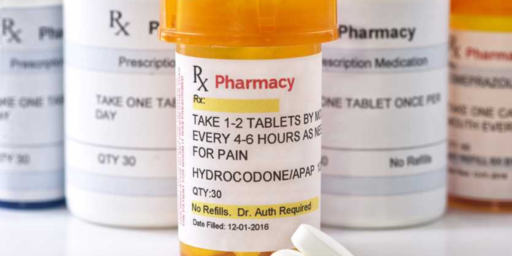Chris Christie: The War On Drugs Isn’t Working
A short clip, submitted for your consideration here:
Christie isn’t really talking about legalization or decriminalization here, of course, and it took him awhile after he became Governor to get on board with New Jersey’s medical marijuana program. Nonetheless, he’s making a good point here. Since the Nixon Administration, the response to drug use has been longer and stiffer jail sentences, even for people caught with small amounts of drugs. It’s not working and more than Prohibition worked. For some of these people, a more appropriate sentence would be diversion into an addiction treatment program. For the others, unless they’ve committed an act of violence, crowding our jails with people who haven’t actually hurt anyone seems silly and wasteful.
Via Twitter






I really wish this whole argument got more play – that the War on Drugs is financially irresponsible because it doesn’t stop the behavior we ostensibly want to prevent. I believe it’s best way to make the winning case. And I also believe that a Republican needs to be the one who makes the case that tips us over the edge into a nation-wide de facto decriminalization – “Only Nixon can go to China” kind of thing.
But then again I always thought that the first black president would have to be a Republican, so I could be wrong.
Doug, quick housekeeping heads up – “and” s/b “any”
The war on drugs has been over for years and the drugs won.
Clips like this make me wish even more that Christie had decided to run, even if just so he could grace a GOP presidential debate stage. He has glimpses of substantial non-party line thinking, but he still has enough of that tough “I’m from Jersey, screw you” persona to shut up or at least shout down the worst elements of the Tea Party.
@Linton:
Christie has actually thought things thru on a number of issues coming to reasonable conclusions based on the known facts before him. Of course this makes him toast in the GOP.
There is a fallacy that people caught with small amounts of drugs go to prison. That is extremely rare. Nearly all of those in prison for drug offenses were either dealing or have multiple arrests for drug possession. Eventually, a drug addict will exhaust every chance at probation and rehab. Prison becomes the only option for someone who continually breaks the law. I believe that there is an argument to be made for legalization, but this isn’t it. You could apply the same logic to murder or any other violent crime. People still commit murder, even when the potential penalty is death, yet no one argues laws against murder are a failure.
Ron Paul would end the drug war
Criminalizing drug users, abusers, and addicts becomes a public health problem when barriers and stigma (from stereotypes and misinformation) prevent access to treatment for those who want/need treatment.
As an addictions psychologist in the field for over 30 years, I have worked with thousands of people who want treatment and are unable to receive adequate care. Treatment for addiction should be available for people in the same manner as treatment for heart disease, diabetes, cancer. $50 Billion per year is spent by the US government in law enforcement and related efforts to reduce/prohibit drug use in our country. Most of the people affected are non-violent offenders.
If even 5% of that $50 billion were spent on treatment for those who want treatment, then we’d be moving in the direction of drug policies based on science, compassion, health, and human rights.
Barry Lessin